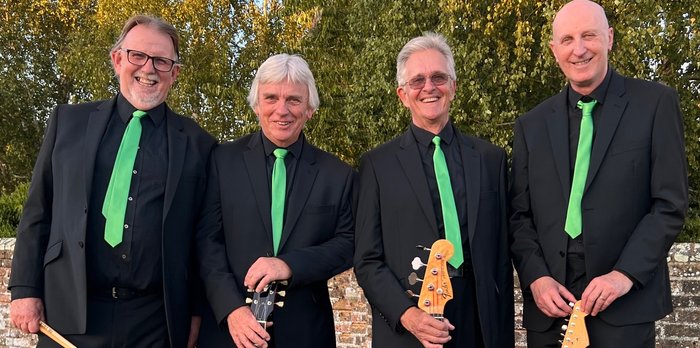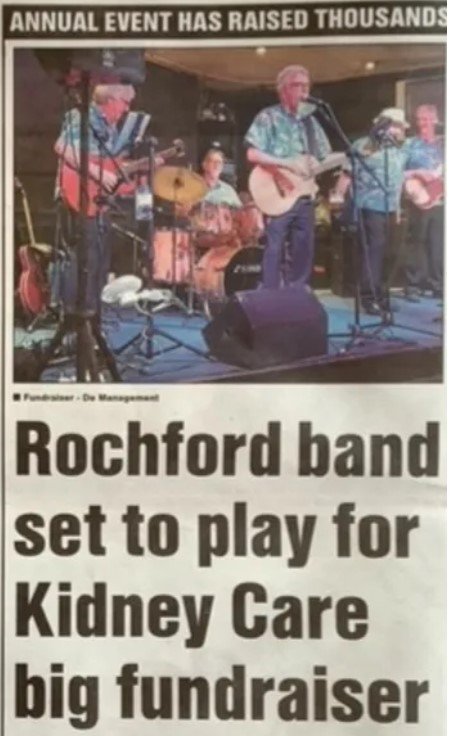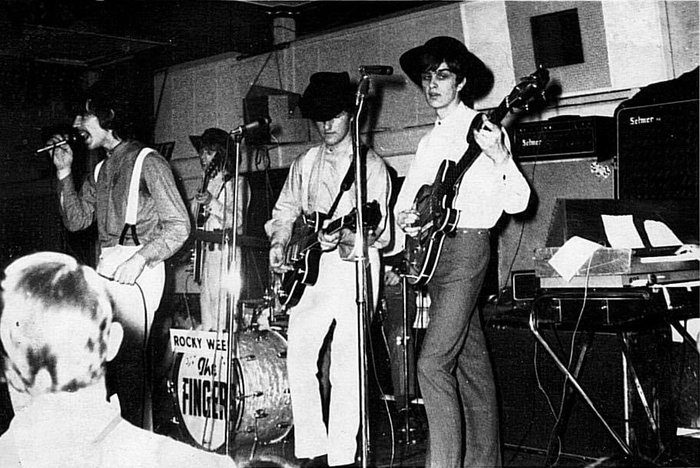"At our first charity gig… I remember thinking, ‘This isn’t nearly as much work as I thought.'"
"I’ve been a musician – a bass guitar player – for over 60 years, and I’ve been organising musical charity gigs on and off since 1996. I helped found Da Management in 2014. We play music from the golden era of pop, well known covers that you can dance and have fun to. There’s always a few jokes, some laughing on stage.
"Da Management also put on charity gigs. At my first charity gig (long before Da Management was formed) there were five bands and one friend brought the PA sound system, another offered to do the MC-ing and introduce the performers. It wasn’t nearly as much work as I’d thought! Being in bands for so long, there is a little musical world where everyone knows everyone else. It was a team effort and after that gig, I began to think it was something I could do often.
"I have a kidney condition known as Focal segmental glomerulosclerosis (FSGS). It’s quite rare, but I have been lucky enough to receive first class care and attention from the Nephrology Department at Southend University Hospital – at times I’ve had to be in hospital to see a consultant once a week. When I found out about Kidney Care UK, my FSGS was very well controlled. I browsed the website for information and realised that lots of other people had serious problems.
"I fundraise because all of us know somebody that is less fortunate than us and will want to support somebody. You meet other well-meaning and nice people fundraising. Da Management – our band – are just nice guys. We want to support deserving causes, by entertaining audiences who also want to help to raise funds."

"It’s all about sharing the right feeling and the right message.”
"We tend to do one fundraising gig a year. Usually, we try and sell 120 or so tickets and we try to play on quieter nights. We’ll say to venues, ‘We’re raising money for Kidney Care UK. If you’ve got a night where there are not many people in, can you let us have the venue for nothing? We can help bring in 120 people. That’s 120 people buying drinks, buying entry.’ The venues often say yes. We know our audience, too; we play 50s, 60s, and 70s numbers and people of a certain age love it.
"Once we start planning a gig, I share and share and share again on Facebook. We always try and sell tickets in advance. Some people buy tickets to donate anyway, regardless of whether they come to the event.
"Six weeks before the event we tackle all the local radio and news publicity. Don’t be nervous approaching radio or news outlets. The first radio interview I ever did was BBC Essex in Chelmsford. I told the presenter that I was nervous doing the interview – it felt so different to a gig. He reassured me, told me to pretend it was just him, me, and no-one else.
"Most years we get two or three local radio interviews and two or three local news articles. I’ve established contact with local news and stations and generally, if it’s for a good charity like Kidney Care UK, the press is happy to cover the story. It is a lot of work, but it’s all about sharing the right feeling and the right message."

"We get a pretty good turnout and have raised as much as £1,000 plus per charity gig. As you fundraise, it becomes easier to ask people for support. You think, ‘I’ve done it now, I can do it again.’ Once we finish the gig, we try and book the next year’s event the day after.
"A while ago I did an event called the “Juppathon,” which raised over £2k. The singer/musician/composer Mickey Jupp is a good friend of mine and because he has a big following, I suggested a “Juppathon”: instead of one big gig, I approached other bands and artists and simply asked them to play at least one Mickey Jupp song at one of their individual gigs over a period of six months, and to get sponsorship from the audience. In the end, we got 63 acts in 22 countries to contribute, including Dr Feelgood and Steve Hooker. We even got a message from Gary Brooker, of Procol Harum fame, wishing us good luck. I arranged a Juppathon gig too, to top things up.
"Generally, people want to help people. I’ve been involved with many charities and my own projects, and the charity concerts we’ve done with Da Management have raised about £5,000. I’ve raised another £8,000 through other fundraising, cycling, JustGiving, writing five books and different charity projects. I’ve had people who have helped us prepare, proof-read and organise publicity, and they haven’t charged. It’s just about asking for help."
Find Da Management on their website and follow them on Facebook.

John’s tips for fundraising through gigs and events
Always start by asking people for help.
Lots of people want to support charities and if you tell them this is a one-off project, they’re often happy to share their skills. It’s about getting people on board. Ask a friend, someone you work with, a member of a club, anyone who can help set the ball rolling. Someone might say, ‘Oh, you want to do this? I know someone who can help who is looking for that. Why don’t you link up and help each other?’
Concentrate your efforts locally.
Local community groups and churches can often help you promote events. Local charities also often have contacts in the third sector. They’ll have lists of people to contact, or a list of venues that have previously support charity events. Social media is also a great place to look for help.
Share what you’re doing as widely as possible.
You won’t get a response from everybody, so don’t get disheartened. Local newspapers often say yes and might do a follow up after the event or ask you what you’re doing next.
Talk to the charity you’re fundraising for.
Explain to the charity why you’re fundraising, find out how they can support you and ask them for tips for raising money. Also, chatting with the charity means that you can make absolutely certain any that publicity you do has their registered name, logos, and brand attached to it. This proves everything is legitimate.
Do what you’re good at.
Think about the skills you have, and do a fundraising project based around them. If you love running, run, if you love music, host a gig. You’ll do a great job because you’ll be doing something you love.
Don’t worry if it all goes quiet.
Sometimes, you set something up and suddenly it just goes silent. It is easy to become dispirited but try not to – it’s just part of fundraising. Sometimes, if a Da Management fundraiser has gone quiet, I post a few times on Facebook, making jokes to encourage people to interact
Make it simple to help or donate.
For example, at past Da Management gigs we’ve let guest acts use a backing track, so they don’t have to bring and setup and take down any of their own equipment. We try and make it as easy as possible. The more obstacles you can remove, the better. To help people donate, use PayPal, let people write cheques, set up a JustGiving page. We often have a raffle at our gigs that brings in extra money. It’s the old salesman trick: make it comfortable and easy for people to pay!